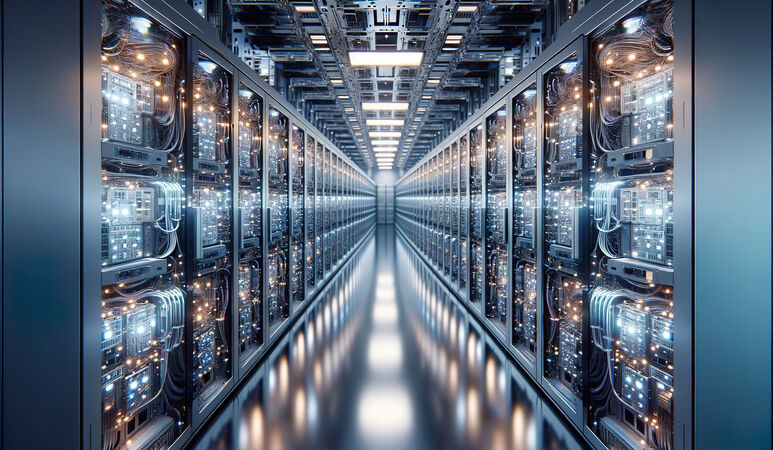High Performance Computing (HPC) of high-performance computers, also known as supercomputers, have become indispensable tools in the modern economy and especially in industry in recent decades. They offer high added value for companies. Their enormous computing power and ability to process huge amounts of data in the shortest possible time make it possible to solve complex problems, accelerate innovation and increase the competitiveness of companies. Baden-Württemberg, known for its strong economy and technological leadership, plays a central role in Germany's supercomputing landscape. The region is home to some of the most powerful supercomputers in the country, which are used for a wide range of applications in science, industry and research.
How high-performance computers work
High-performance computers are characterised by their exceptional computing capacity, which is achieved through the parallel processing of tasks in a large number of computing nodes. These computing nodes consist of powerful processors that are interconnected by fast networks. In contrast to conventional computers, which process tasks sequentially, supercomputers can perform millions of calculations simultaneously. This is made possible by advanced software and algorithms that have been specially developed to utilise this parallel architecture.
Areas of application in the economy
In companies and especially in industry, high-performance computers are often used to carry out complex simulations and analyses. The Stuttgart Supercomputing Centre, for example, has one of the fastest supercomputers in Germany, the HAWK supercomputer, and makes up to 10% of its computing power available for commercial use .
With their extreme computing power, supercomputers enable highly complex simulations, e.g. the virtual development and testing of new vehicle models in the automotive industry, load simulations in mechanical engineering, optimisation of chemical processes, genetic analyses in medicine, digital twins in industry, machine learning in the field of artificial intelligence and the aerospace industry uses supercomputers for the development and optimisation of aircraft and spacecraft.
Challenges and future prospects
Despite their impressive computing power, supercomputers face challenges such as high energy consumption and the need for constant technological renewal. Baden-Württemberg is therefore also working intensively on the development of energy-efficient data centres and new technologies such as quantum computers. The "High Performance Computer Karlsruhe" (HoreKa) of the Karlsruhe Institute of Technology (KIT) ranks sixth among the world's most energy-efficient supercomputers according to the Green500 list. With 88 new accelerator processors, the supercomputer from Karlsruhe has increased its performance to more than 20 petaFLOPS (one quadrillion computing operations per second), making it one of the fastest computers in Europe at present.
Efficient cooling, intelligent power management and optimised hardware architectures help to minimise the supercomputer's energy consumption.
The development of quantum computers could represent the next revolution in this field by solving problems that are unsolvable for current supercomputers.
The future of high-performance computers in business is promising. As technology advances, they will become even more powerful and accessible, opening up new application possibilities. Companies that integrate these technologies at an early stage could gain a significant competitive advantage and significantly boost the innovative strength of their company or industry.
Conclusion
High-performance computers are a key factor for progress in many industries. Their ability to quickly process enormous amounts of data and perform complex simulations is revolutionising the way companies work and innovate. While challenges remain, the potential of this technology is enormous and will continue to shape industry in the future, contributing to the innovative strength and competitiveness of Baden-Württemberg and Germany. Germany ranks third in the world for locations with the most powerful supercomputers, and Baden-Württemberg is home to some of the fastest and most efficient high-performance computers in Germany.
